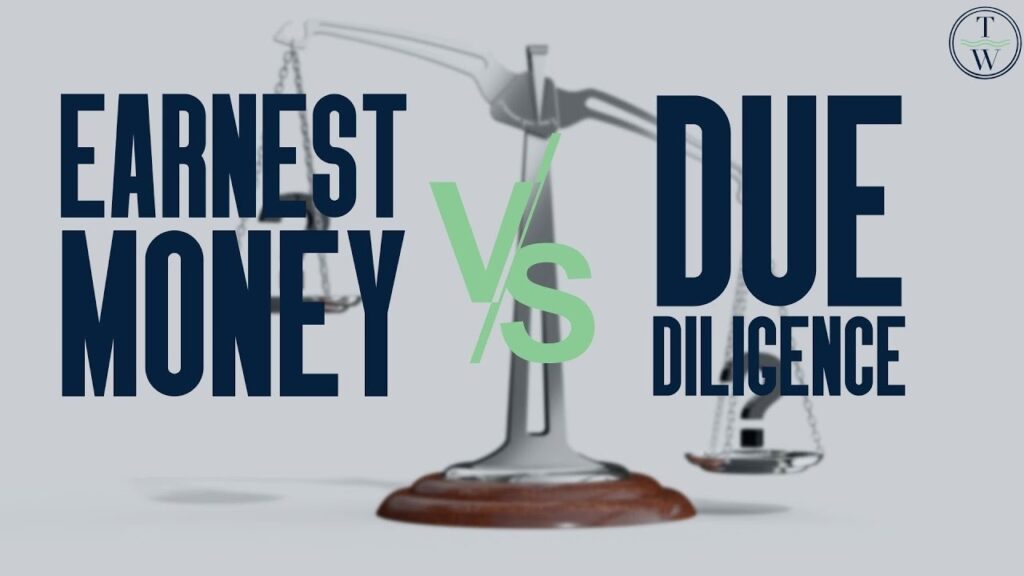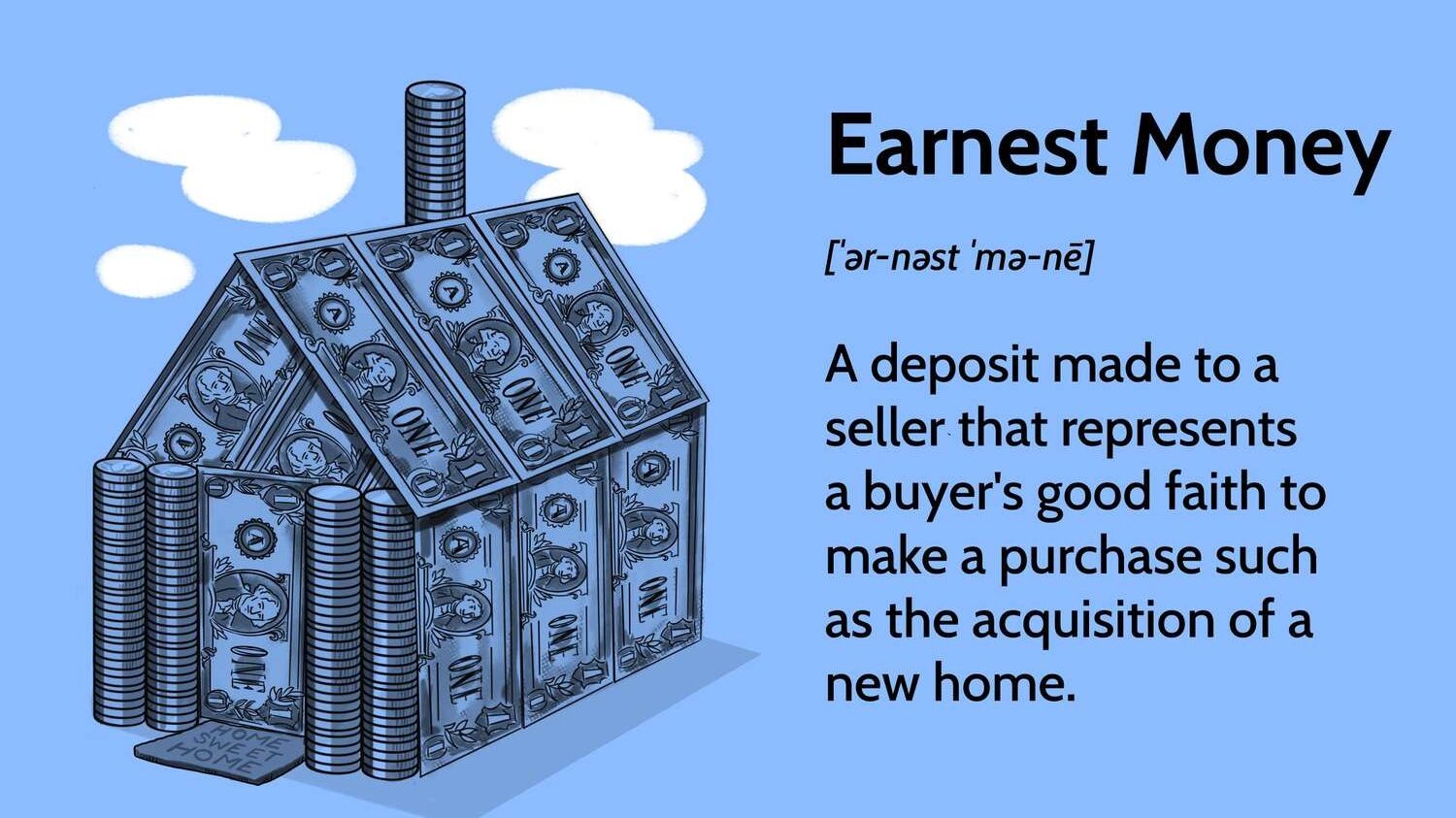Introduction
In real estate transactions, the terms “earnest money” and “due diligence” are crucial, but many buyers and sellers are unsure about the distinctions between the two. Understanding these concepts—earnest money vs due diligence—can significantly impact the outcome of a real estate deal. Both serve unique purposes in securing the transaction, but they are often confused due to their similar objectives. In this guide, we will break down due diligence vs earnest money and explore how each element works, how they differ, and why both are vital for a smooth real estate transaction.

Understanding the Key Differences Between Earnest Money and Due Diligence
Although due diligence real estate vs earnest money are terms that are often used together, their roles are distinct. Earnest money is a deposit made by the buyer to show good faith, whereas due diligence money vs earnest money refers to the process where the buyer inspects the property and verifies the necessary details before finalizing the deal. Both processes work together, but at different stages of the transaction, serving different purposes.
The Importance of Both in Real Estate Transactions
Both earnest money vs due diligence contribute to ensuring a successful deal. Due diligence real estate vs earnest money helps to protect both the buyer and the seller from risks that could affect the value or viability of the transaction. Earnest money deposit vs due diligence demonstrates the buyer’s commitment, while due diligence fee vs earnest money allows the buyer to verify the property’s condition and any legal or financial risks associated with it.
Definition and Overview of Earnest Money

What is Earnest Money and Why Is It Required?
Earnest money is a deposit paid by the buyer to the seller to indicate the buyer’s serious intent to follow through with the transaction. It serves as a form of security for the seller. If the buyer pulls out of the deal without a valid reason, the seller is generally entitled to keep the earnest money deposit vs due diligence. This deposit is usually a percentage of the property’s sale price (typically between 1-3%), depending on the market and agreement between the parties.
How Earnest Money Functions as a Sign of Good Faith
Earnest money is meant to assure the seller that the buyer is not only interested in the property but is committed to completing the purchase. The earnest money deposit vs due diligence helps protect the seller’s time and resources by filtering out uncommitted buyers, providing some financial compensation if the buyer withdraws without cause.
Typical Earnest Money Amounts and How They’re Determined
The amount of earnest money varies by region and market conditions. In competitive markets, buyers may offer higher earnest money to make their offer stand out. However, the due diligence fee vs earnest money typically does not influence the earnest money amount directly, although both can impact a seller’s decision.
The Role of Earnest Money in Real Estate Deals
Earnest Money in Residential vs Commercial Real Estate
In residential real estate, earnest money is usually a small percentage of the property’s purchase price, while in commercial real estate transactions, earnest money vs due diligence often involves larger sums due to the higher value of properties. Despite the differences, both serve the same purpose: demonstrating buyer commitment.
The Impact of Earnest Money on Buyer and Seller Behavior
For buyers, earnest money is an initial investment in their future home, while for sellers, it provides a level of security in the transaction. When it comes to earnest money vs due diligence in North Carolina (NC) and other regions, both processes influence the negotiating behavior of both parties.
What Happens if Earnest Money is Not Paid?
If earnest money is not paid, the seller may view the buyer as uncommitted, potentially resulting in the deal falling apart. Sellers may also be less likely to accept offers from buyers who do not present earnest money deposit vs due diligence upfront, as this signals a lack of serious intent.
Definition and Overview of Due Diligence
What is Due Diligence in the Context of Real Estate?
Due diligence is the period during which the buyer evaluates the property, checking for any legal, physical, or financial issues that could affect the deal. Unlike earnest money deposit vs due diligence, the buyer uses this time to inspect the property’s condition, examine documents, and verify the feasibility of the transaction.
The Purpose of Due Diligence in the Transaction Process
The goal of due diligence vs earnest money is to identify any hidden issues that could affect the value of the property or the buyer’s investment. This process provides the buyer with a comprehensive understanding of the property’s potential and risks, protecting them from unexpected problems that may arise post-purchase.
Key Aspects of Due Diligence in Real Estate Deals
Key steps in the due diligence real estate vs earnest money process include property inspections, legal document reviews, title searches, zoning verification, and financial analysis. Buyers must use this period to identify any red flags that could affect their decision to move forward.

The Role of Due Diligence in Real Estate Transactions
How Due Diligence Protects Buyers and Sellers
Due diligence allows the buyer to verify that the property is in good condition and free of legal issues. For sellers, due diligence fee vs earnest money protects them from buyers who may not fully understand the implications of the transaction, thus minimizing the risk of deal cancellations.
What Happens During a Due Diligence Period?
During the due diligence period, the buyer assesses the property’s condition through inspections, reviews the title and legal aspects of the property, and investigates local zoning regulations. If issues arise, the buyer may request repairs, price adjustments, or may even opt to cancel the contract.
Typical Costs Involved in the Due Diligence Process
The due diligence fee vs earnest money often involves costs such as home inspections, legal fees, or title searches. These are typically paid by the buyer and are separate from the earnest money deposit, which acts as a form of security.
Key Differences Between Earnest Money and Due Diligence
The Purpose and Function of Earnest Money vs Due Diligence
Earnest money vs due diligence both serve to protect the interests of both the buyer and seller. However, earnest money deposit vs due diligence works as a commitment from the buyer, while due diligence real estate vs earnest money is used to assess the viability of the transaction.
Timing of Earnest Money vs Due Diligence in Real Estate Deals
Earnest money vs due diligence also differs in terms of timing. Typically, earnest money is paid when an offer is made and accepted. After the earnest money is paid, the due diligence period begins, where the buyer inspects and verifies the property’s condition.
Financial Implications of Earnest Money vs Due Diligence
Earnest money is a fixed deposit that is credited toward the buyer’s down payment or closing costs. Due diligence fee vs earnest money, on the other hand, represents the costs involved in assessing the property. Both contribute to the overall financial commitments of the transaction.
Legal Aspects: Earnest Money vs Due Diligence
Legally, earnest money is governed by the terms outlined in the purchase agreement. If the buyer cancels the deal for any reason that is not specified in the contract, they may forfeit the earnest money. Similarly, due diligence vs earnest money NC typically involves state-specific regulations and requirements.

Earnest Money: Risks and Benefits for Buyers and Sellers
How Earnest Money Affects Seller Confidence
Earnest money reassures the seller that the buyer is serious about the deal. This deposit helps build trust, creating confidence in the transaction. Earnest money deposit vs due diligence ensures that the seller’s time isn’t wasted.
What Happens to Earnest Money if the Deal Falls Through?
If the deal falls apart due to contingencies like inspection issues or financing problems, the earnest money may be refunded. However, if the buyer cancels the deal without a valid reason, the seller generally keeps the earnest money.
Earnest Money Refund Scenarios: Understanding Contingencies
Understanding contingencies is essential when it comes to earnest money vs due diligence. Buyers need to know the conditions under which they can recover their earnest money deposit if the transaction doesn’t go through.
Due Diligence: Risks and Benefits for Buyers and Sellers
How Due Diligence Mitigates Risk for Buyers
Due diligence allows buyers to assess risks and avoid costly surprises after purchasing the property. Conducting thorough due diligence ensures that the buyer is fully aware of any issues that may require attention.
What Happens if Due Diligence Reveals Issues with the Property?
When issues are discovered during the due diligence period, the buyer may renegotiate the terms or ask for repairs. In some cases, buyers may cancel the deal if the property’s problems are too significant.
The Role of Due Diligence in Negotiating the Final Deal
Due diligence vs earnest money also plays a significant role in negotiations. If serious issues are uncovered, the buyer may use these findings to renegotiate the price, request repairs, or cancel the agreement entirely.
How Earnest Money and Due Diligence Work Together
Coordinating Earnest Money and Due Diligence in a Transaction
Both earnest money vs due diligence are crucial to the success of the transaction, and while they operate at different times, they complement each other. Properly coordinating both ensures that the buyer is committed and that the property is thoroughly assessed before the final deal.
The Sequence of Events: Earnest Money, Due Diligence, and Closing
Typically, earnest money is paid first, followed by the due diligence period, where inspections and legal checks occur. Once both are successfully completed, the deal proceeds to closing.
How a Comprehensive Approach to Both Can Lead to Successful Deals
Successfully managing earnest money deposit vs due diligence is key to closing a successful deal. A comprehensive understanding of both elements helps to minimize risks and leads to a smoother transaction process.
Conclusion
The Critical Role of Earnest Money and Due Diligence in Real Estate
Both earnest money vs due diligence are essential for securing a successful real estate deal. By understanding their differences, roles, and how they work together, buyers and sellers can approach transactions with confidence.
Ensuring a Smooth Transaction Process with Earnest Money and Due Diligence
A clear understanding of due diligence vs earnest money allows both parties to navigate the complexities of a real estate deal with greater assurance, reducing risks and increasing the likelihood of a successful transaction.
Final Thoughts on Earnest Money vs Due Diligence
In conclusion, earnest money deposit vs due diligence is a critical concept for anyone involved in real estate. Properly understanding the distinctions and the relationship between these two elements is essential for making informed, strategic decisions during the home-buying or selling process.


